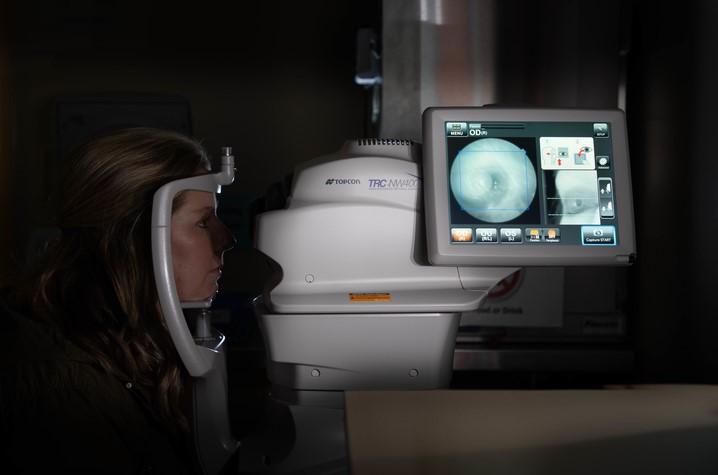Barnstable Brown Diabetes Center introduces groundbreaking AI-powered retinal screening

UK HealthCare’s Barnstable Brown Diabetes Center is proud to be the first and only location in the state using a new state-of-the-art camera with artificial intelligence (AI) to detect retinopathy in their patients.
“This technology is important because diabetes can cause a complication called diabetic retinopathy," said Kristen Stakelin, M.D., medical director at Barnstable Brown Diabetes Center. "Our patients with diabetic retinopathy often have no symptoms until it is severe, leading to blindness if not treated. The earlier diabetic retinopathy is detected, the more treatable it is. The retinal camera allows us to screen for retinopathy while a patient is in the office to assess their risk.”
More than 440,000 adults in Kentucky have diabetes. That’s 12.9% of the Commonwealth’s population of people ages 18 and older. Only six other states have a higher diabetes prevalence rate. Those numbers contribute to the national estimate of 37 million Americans living with diabetes and of those, 30% suffer from diabetic retinopathy.
What is diabetic retinopathy? For people with diabetes, high blood sugar levels can, over time, damage tiny blood vessels in the retina, which is the back part of your eye that detects light. As a result, these weakened blood vessels may leak, rupture and detach the retina leading to vision loss and blindness. Diabetic retinopathy is one of the most common causes of blindness in the United States. Around 220,000 Americans are blind due to this disease.
All of these statistics are why leaders at the Barnstable Brown were eager to obtain the groundbreaking technology.
“Bringing the latest technology to the Barnstable Brown Diabetes Center helps us fulfill our promise to our patients to provide them with the best possible care,” said Simon Fisher, M.D., Ph.D., director of the Barnstable Brown Diabetes Center. “Our patients will benefit greatly by using this AI-powered eye scanner to identify early stages of retinal abnormalities during routine clinic visits. With retinal screening, our health care providers can immediately alert patients to potential vision-threatening retinopathy and follow up care can be made with retinal specialists.”
Before acquiring this technology, on-site screening was not performed at the Barnstable Brown. Patients were referred to ophthalmology offices for screenings, which providers say often patients did not attend or schedule.
“This is a huge win for patient care because there are so many patients who do not have regular appointments with their ophthalmologist," said Stakelin. "We can now screen those patients in under a minute and identify if they are high risk or not for diabetic retinopathy.”
The retinal camera communicates with an AI software called EyeArt. EyeArt was developed by a Los Angeles-based health care technology company, Eyenuk. The EyeArt Technology offers significant advantages over traditional screening techniques in that it is non-invasive, extremely accurate and provides point-of-care results in under 60 seconds. EyeArt is the first and only technology cleared by the Food and Drug Administration to detect both more-than-mild and vision-threatening diabetic retinopathy. The equipment allows for imaging of the interior of the eye without the need for eye dilation.
How does it work? The camera takes a picture of the back of the eye called the retina. The AI technology detects abnormal blood vessels on the retina that may bleed easily. Abnormal retinal blood vessels can lead to poor eyesight, blank spots in vision, swelling of the back of the eye and blindness. With early screening for retinopathy, the risk and effects of diabetic retinopathy can be minimized or eliminated entirely, keeping patients’ eyesight intact and allowing them to enjoy a full, unrestricted lifestyle.
Stakelin has started screening patients with the new retinal camera and says they were very pleased with the ease and speed of the process.
“We do remind our patients this is only a screening and does not replace regular eye exams. The images only screen for diabetic retinopathy, but not other things like cataracts, glaucoma, visual acuity," she said. "The main benefit of the AI-powered retinal screen is to provide point-of-care testing to determine if a patient has early stages of diabetic retinopathy and therefore needs referral for vision preserving treatment by ophthalmological specialists. We still recommend patients see their ophthalmologist annually, but for people who don’t see ophthalmologists regularly, point-of-care eye screening plays an important role with early detection of diabetic retinopathy.”
The Barnstable Brown Diabetes Center was established in 2008 by twin sisters Patricia Barnstable Brown and Priscilla Barnstable along with their mother, Wilma. Together, they pledged the initial funding to support the center in memory of Patricia Barnstable Brown’s husband, David, who passed away in 2003 from complications of diabetes. The family has continued to support the center through the years, donating more than $17.25 million.
For 34 years, on the eve of the "Run for the Roses," the Barnstable Brown Derby Eve Gala has taken place in Louisville, Kentucky. The star-studded gala centered around the fastest two minutes in sports has helped create a center designed for a much longer run — the entire lifespan of each patient — providing care from pediatrics to adults with one coordinated clinical team.
“With the burden of the disease disproportionately affecting Kentuckians, the generosity of support from the Barnstable Brown family helps fill an immense need of our population. The number of patients seen at UK HealthCare’s Barnstable Brown Diabetes Center has doubled in the past five years, with more than 22,000 Kentuckians receiving specialized medical care at the center during this past year alone,” said Fisher. “Continuing to provide cutting edge technology, the highest level of patient care, and innovative research is an important mission of the Center in promoting health within the Commonwealth.”






